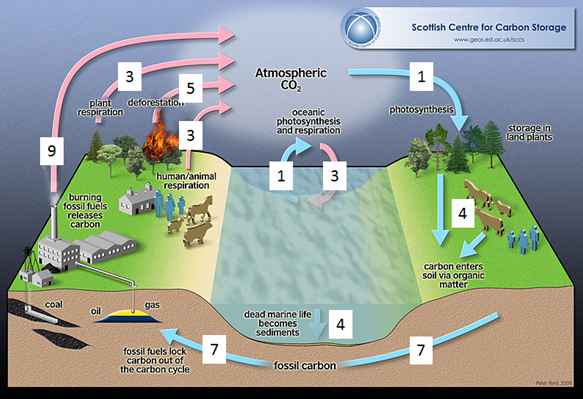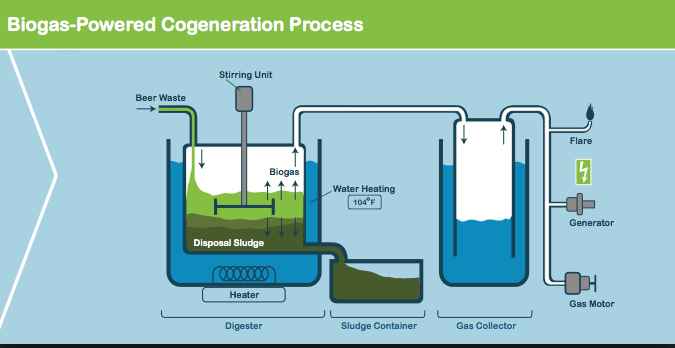Biogas, an unparalleled ally against climate change!
Biogas could play a big role in the fight against climate change. Several experts make this observation at a time when COP24, the summit for climate, ends, in December 2018. While the public reiterate to the governments in the world the urgency to act, part of the solution could be in the use of biogas to its full potential. What role could biogas play in the green energy mix? Can we really think of it as a renewable energy?
Why is biogas a renewable energy?
Its carbon-neutral production process makes biogas a renewable energy and a solution to the fight against climate change. Indeed, the biogas is produced by the fermentation of various organic materials with bacteria in an anaerobic environment, that is to say, one that is devoid of oxygen.
Here are some examples of materials used to produce biogas:
- agricultural waste
- manure
- sewage sludge from municipal water treatment plants
- food waste
When they decompose, these materials emit CO2 and methane, an energy with a global warming potential more than 20 times higher than CO2. The methane and the CO2 absorbed during the growth of the plants or contained in the materials are thus reused, then transformed into an useful and clean energy. This short carbon cycle makes biogas a carbon neutral energy when released.

Source: Scottish Center for Carbon Storage
The production of biogas is therefore part of a circular economy, a sustainable management of waste and production of renewables.
What are the uses of biogas?
Biogas has multiple uses because of its an highly flexible energy, an advantage in the fight against climate change. This is particularly true for areas that are difficult to decarbonise and have high emissions such as transport, heating and agriculture.
The Anaerobic Digestion & Bioresources Association (ADBA) estimates between 18 and 20% the potential reduction of GHGs in the sectors named above, plus waste management through biogas.
In short, biogas is one of the solutions to fight climate change and help countries reach their climate targets.
Biogas as fuel
The use of biogas as fuel and the use of other renewable energies for transportations are among the major challenges of global warming. It is indeed the main source of GHG emissions in the world.
According to the European Biogas Association, the consumption of fossil fuels in transportations was responsible for 31.6% of the GHG emissions in the European Union in 2013. By using biogas as a fuel to fight against climate change, we would reduce GHG emissions by more than 50% compared to the use of coal and natural gas.
The following is a summary table of expected GHG emission reductions:

Source: European Biogas Association
Biogas becomes particularly efficient when used in heavy-duty transports such as trucks or buses. Indeed, in this case, the energy transition can be more complex and expensive, and the electrification of these transports is often disadvantageous.
Here are some examples of challenges in this area:
- need to store large amounts of energy
- the cost and profitability of vehicles
- the versatility of the type of fuel chosen
Note that biogas must first be purified into biomethane, or renewable natural gas, to be used as fuel in vehicles.
Biogas for heating
Biogas can also be used for heating, one of the most important contributors to climate change in the world. This is especially true in countries using coal to produce heat and electricity.
For example, in Europe, the energy supply sector accounted for 1280 million tonnes of CO2 equivalent in 2016 according to the European Environment Agency. The simultaneous generation of electricity and renewable heat with a biogas CHP unit therefore has a great potential to reduce GHGs in this sector.
The following diagram summarizes the operation of a biogas CHP unit.

Source: Brewing and Sustainability
For more information, see also our article about biogas cogeneration and electricity generation and technologies.
Biogas in agriculture
Biogas has a great potential for the fight against climate change in the agriculture sector. In Europe, in 2016, this sector was responsible for 511 million tonnes of CO2 equivalent, according to the European Environment Agency.
Farmers are increasingly concerned about protecting the soil and the environment around their land. They are adopting sustainable farming practices to transition to a carbon neutral industry and mitigate global warming.
Biogas offers many opportunities for farmers in a perspective of circular economy and GHG reduction. Here are some examples:
- produce biogas on the farm to power its buildings with electricity and heat or to earn extra income by selling energy
- use the enriched digestate created by the production of biogas
- capture and sequestration of carbon in the soil to reduce GHG emissions
- implement energy efficiency practices
Read our article to learn more about biogas production at the farm.
Biogas, combined with other renewable energies
Biogas must be part of the energy mix for an efficient fight against climate change, as it complements renewable energies such as wind or solar energy. It is an important ally to propel the energy transition, act as a bridge between gas and other energies, and compensate for some of their weaknesses. Indeed, energy production by solar and wind depends on the variations of temperature and cannot be stored, in particular.
Biogas has several advantages over other renewable energies such as:
- a continuous supply of energy during seasonal consumption peaks or temperature variations.
- storing electricity by converting it to a renewable gas. For example, if there is surplus electricity, the energy can be used later, if needed.
- tighter control of energy costs.
- the ability to better meet the growing needs of green energy
Experts often emphasize the need to implement a mix of energy and complementary energies rather than bet on a single energy. The energy transition and the fight against climate change will only be more effective!
The potential of biogas to combat climate change studied
In the wake of COP24, experts published reports highlighting the contribution of biogas to combat climate change.
Biofuture Platform Report
A new government initiative bringing together members from 19 countries released a report on global warming and bioenergy during COP24. According to their report, the use of biofuels and by-products is essential to achieving global GHG emission reduction targets.
Their report also identifies several barriers to the deployment of biogas and bioenergy, including:
- the high level of risk perceived by investors making it more difficult to seek financing for commercial production and research and development.
- the low competition of biofuels compared to fossil fuels in several markets.
- policies that are not favorable to biofuels
- sustainable input supply for biofuel production, often insufficient, unreliable or very expensive
To achieve the targets, global biofuel production is expected to increase to more than 200 billion liters annually by 2025. Production of 2nd and 3rd generations of biofuel is also expected to grow significantly. Take a look at the report to learn more.
COP24: Report of the Intergovernmental Panel on Climate Change (IPCC)
The IPCC has prepared this report for COP24. It proposes possible scenarios in case of global temperature increases of 1.5 ° C or 2 ° C and solutions to mitigate the consequences of climate change.
To limit the temperature at this level, the IPCC suggests, in particular, a reduction of methane and carbon emissions by at least 35% by 2050, compared to 2010 levels. Among the measures proposed are the reduction of methane and carbon monoxide and sequestration or storage of carbon in agriculture. This is without forgetting the reduction of methane emissions in the waste management sector.
Moreover, the report states that renewable energies should account for between 70 and 85% of the electricity produced by 2050. Biogas has proved its effectiveness in fighting climate change in all these sectors, from agriculture to waste through the production of renewable electricity.
See the IPCC report for more information.
Biogas to fight climate change: A call for action heard by the industry
In recent months, several governments have already implemented energy transition policies favoring biogas. A recent example: REDII, adopted by the European Parliament, requires a minimal share of advanced biofuels in fuel.
The industry is working to promote the potential of biogas and renewable energies to decision-makers to accelerate the energy transition. BiogasWorld is part of the movement as an informational and commercial platform to connect industry players.
Feel free to subscribe to our newsletter and subscribe to our social networks to learn more about the industry and follow its news.
To know more:
- Green Gas: Facilitating a future green gas grid through the production of renewable gas, IEA Bioenergy
- Reducing GHG Emission (in agriculture), Climate Action Initiative : BC Agriculture & Food
- Le biogaz est-il une énergie renouvelable?, Connaissance des énergies (In French only)
- Biomethane in Transport, European Biogas Association
- Anaerobic Digestion and Climate Change – Making Biogas to Reduce Greenhouse Gases, ADBA
- Natural gas: a solution for a clean and decarbonized transport system, NGVA

